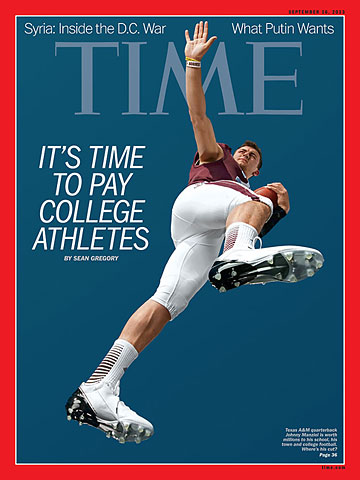
(6 of 7)
Reforming college sports won't be simple. Paying only men, for example, could face a challenge under Title IX, the federal law requiring gender equity in sports. Salary caps require collective bargaining, which means athletes would likely have to unionize; some states offer limited bargaining rights for public employees. These challenges, however, aren't an excuse to keep a broken system. Smart people can figure out a way to make fairness work. "Amateurism is under attack," says Gabe Feldman, director of Tulane University's sports-law program. "There's an incentive for schools to redesign the model themselves rather than have the Congress or the courts do it for them."
Paying players has risks. Richer schools could buy up talent and disrupt competitive balance. Alumni and fans could be turned off by an even more professionalized game. Paying players could make even more of a mockery of education. Right now, for example, many athletes cluster into easy majors in order to stay eligible on the field. If they're making good money while still in school, they may not care one lick about learning. "I just don't think we ever want to go down the path of creating an employee-employer relationship with student-athletes," says Bob Bowlsby, commissioner of the Big 12 conference. "This is higher education, and it always ought to be higher education."
But too often, it's not. The federal graduation rate for football players at Big 12 school Oklahoma, for example: 38%. (Federal rates count athletes who transfer out or leave school for the pros as nongraduates; the NCAA's more generous "graduation success rate" for Oklahoma football is 47%; Oklahoma's federal rate for the entire student body is 65%.) At some schools, it's difficult to know what graduation really means: at the University of North Carolina, for example, grades were changed and bogus classes were offered for athletes and nonathletes alike. College sports are already impure; paying players can't make things much worse. At the highest levels, the games are mass entertainment.
As for the less crucial worry about competitive balance, it doesn't really exist in college sports right now since the best players are already going to the top schools. SEC schools have won the past seven national football championships. Nearly every top-ranked high school football recruit goes to schools in the SEC, Atlantic Coast Conference, Big 12, Big 10, Pac-12 or Notre Dame. Payments for basketball players wouldn't harm the NCAA's crown jewel, the March Madness men's basketball tournament. We could still see Cinderella. The kids who wind up at, say, Lehigh University go to Lehigh because Duke doesn't deem them good enough for a scholarship--and certainly wouldn't deem them good enough for a scholarship plus more. So if Lehigh could upset the big stars from Duke back in 2011, they could still upset the big stars from Duke tomorrow, even if the Duke guys got some extra cash.
